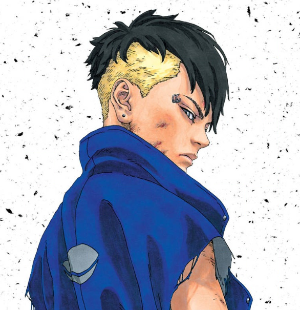Kawaki or: How I Learned to Stop Worrying and Love the Bomb
There's something visceral about Kawaki's past even if it's not our past, our lived experience; it's inextricably tied to the experience of being a human. You will cross paths with people who have been hurt by the very people who were supposed to protect them.

I did not start out sympathizing with Kawaki.
I often struggle with rival deuteragonists. It's not their attitude that gets to me—I'm rather fond of surly curmudgeons. Rather, it's their disaffection, their alienation from those who truly care about them, that I have trouble empathizing with.
I know the loner character speaks deeply to some people, the ideation of an avenging rebel against the world, someone whose pain saturates them so deeply that they're unable to absorb the love that pools around them, but I am not one of them. I love stories of family and friends, connected hearts and connected wills, imperfect people striving to do what they can to make their worlds and communities better places.
My admission is this: In the first fanfic I wrote for Boruto, something I started before completing the series or reading the manga, a work that will never see the light of day, I simply wrote Kawaki out of the picture. He was inconvenient to the story I wanted to write, a dark mark on a future Konoha as I envisioned it, an antagonist I didn't know how to redeem.
So, what changed?
A big shift in my perspective occurred when I read the manga not once, but multiple times, following the story in Kawaki's own steps, seeing the world through his eyes. In Naruto, Sasuke's family was long gone and he sought vengeance for their death. In Boruto, the harm inflicted upon Kawaki began almost at birth and continued long after he arrived under Naruto's roof. We watch as trauma upon trauma is piled atop him: Delta's attack on Naruto; Jigen's invasion of Naruto's house, taking away the man who'd promised Kawaki he could protect him; Naruto's near-death with Isshiki and again against Momoshiki in the body of Boruto.
Kawaki is not an avenger; he's a protector. But in the way revenge is often fixated on the person or system who committed a transgression, Kawaki's defense is focused on Naruto's goodness. This focus that creates a myopic view of right and wrong; any acts to meet one's goal is justified.
As a series, Boruto backs Kawaki into a corner in which his acts are justified, the morality of said acts notwithstanding. The plot forces us to ask, "If not this, then what?" If Kawaki hadn't killed Boruto, would Momoshiki have revived? If Omnipotence hadn't been triggered by Kawaki's desperation after trying to kill Boruto a second time, would Boruto have had the mental fortitude to fight back against Momoshiki? If Kawaki didn't ask Amado for more power now, asking him to do anything within his power to make him stronger, will Kawaki and Boruto be able to defeat the Shinju?
At one point, the answers to these questions were unknowns. But with Koji and Prescience now introduced to the plot, we can see how the world has been walking a tightrope through the entire story, and it seems possible that variations in the sequence of events as they happened could have led to calamity.
I mentioned that part of the empathy I have for Kawaki comes from the story; the other part comes from my own life; my mother has a background not dissimilar to Kawaki.
She was placed in an orphanage by her own mother when she was two, taken back out of the orphanage by her mother when she was old enough to start school. Her young life was unstable and chaotic, being placed with different family members as her mother was in-and-out of mental hospitals as a result of schizophrenia. She had no father. She was abused.
At the age of ten, her mother was finally committed to an in-patient psychiatric hospital and my mother was placed with a foster family. When my mother talks of her foster family, it is always with love, adoration, and thankfulness. After all, they took her into their home and raised her for eight years. But within her stories, and from the stories of others, you can see the cracks. The little things they did that differentiated her from their own children, the way she belonged to them rather than they belonging to her. But the imperfections are something she's unable to see herself.
My mother is an amazing person, both for who she is and all that she went through. But it's impossible not to see those cracks in her, the lines where her vase was glued back together.
Sometimes, it's the little things. She's not good at tradition, holiday traditions specifically. She wants to celebrate Christmas so much, but there will be these little tweaks every year, these inconsistencies as though she's trying to establish something new because no one gave her a path to follow.
There are big things, too. She's a simmering pot of righteous indignation just waiting for someone to turn up the heat so it can boil over. She believes in justice and fairness in all its goodness but expressing it can manifest in unproductive anger and irrationality, often focused on one little pinprick in a much larger picture. I remember once, when I was in grade school, being asked to draw an allegory for my family, and when I was done, trying to explain to the instructors why my mom was depicted as both a steamroller and volcano.
You can see why I sympathize with Kawaki. Something I've said about the difference between the Naruto series and the Boruto series is that it's pretty unlikely you're ever going to run into someone whose entirely family line got wiped out by their brother, but you probably know someone who was abused.
There's something visceral about Kawaki's past even if it's not our past, our lived experience; it's inextricably tied to the experience of being a human. You will cross paths with people who have been hurt by the very people who were supposed to protect them.
While the well of my empathy for Kawaki is deep, I am not someone who will cheer on his descent or the destruction it might cause. I feel sick, not excited, when considering the extremes he might go to in his quest to rid the world of all Otsutsuki and Shinju. I think it's worth viewing his actions through his worldview and situation, giving them context, but not delighting in the pain he inflicts on others.
I believe in the adage hurt people hurt people (those who have experienced pain will cause pain to others), but I also believe each human should try to be living their own harm reduction program, asking themselves what they can do to limit the suffering of those around them. I'm hanging onto Kawaki's story in hopes that when the plot finally gives him a choice, he chooses the right direction.
